选择性必修第一册 Unit3 ConservationLesson 3 The Road to Destruction 公开课课件(共24张PPT)
文档属性
| 名称 | 选择性必修第一册 Unit3 ConservationLesson 3 The Road to Destruction 公开课课件(共24张PPT) | 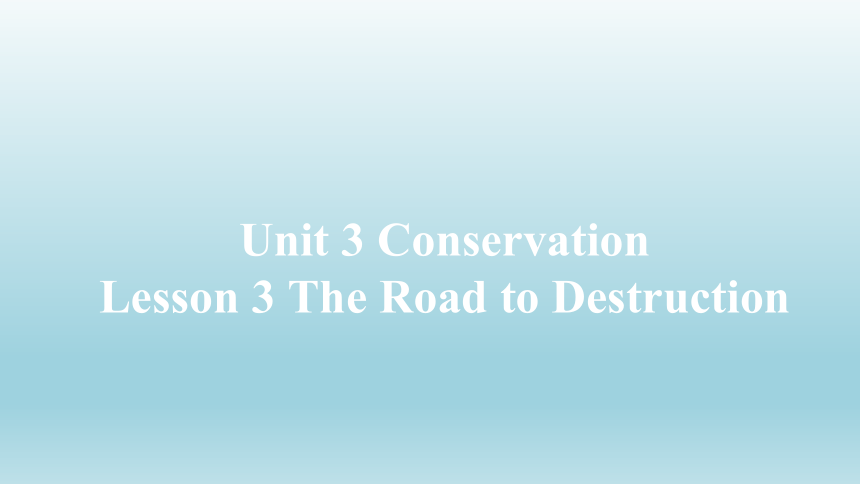 | |
| 格式 | pptx | ||
| 文件大小 | 980.8KB | ||
| 资源类型 | 教案 | ||
| 版本资源 | 北师大版(2019) | ||
| 科目 | 英语 | ||
| 更新时间 | 2023-03-16 20:37:16 | ||
图片预览

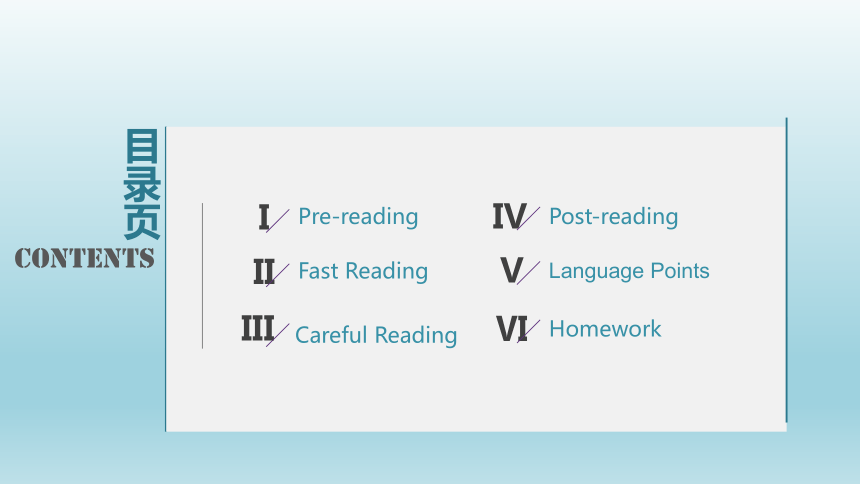
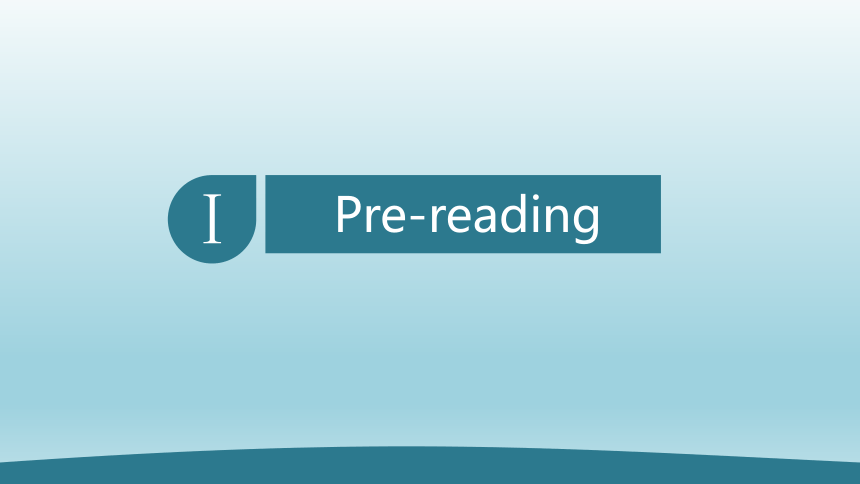
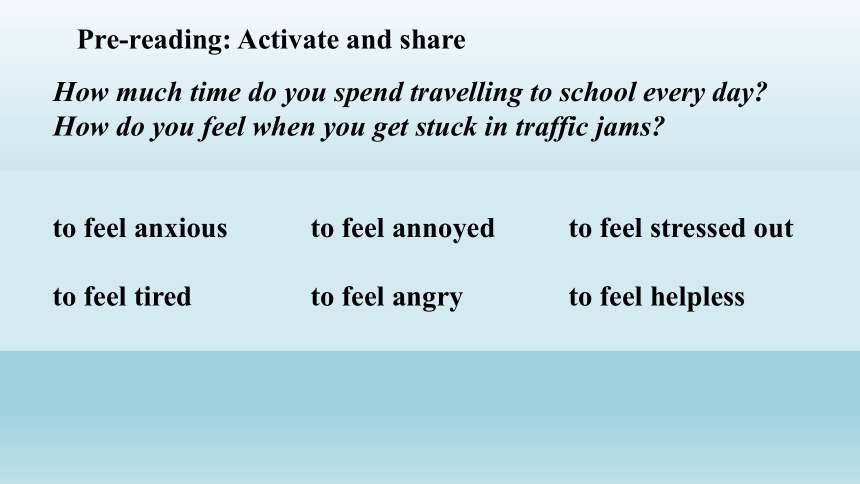
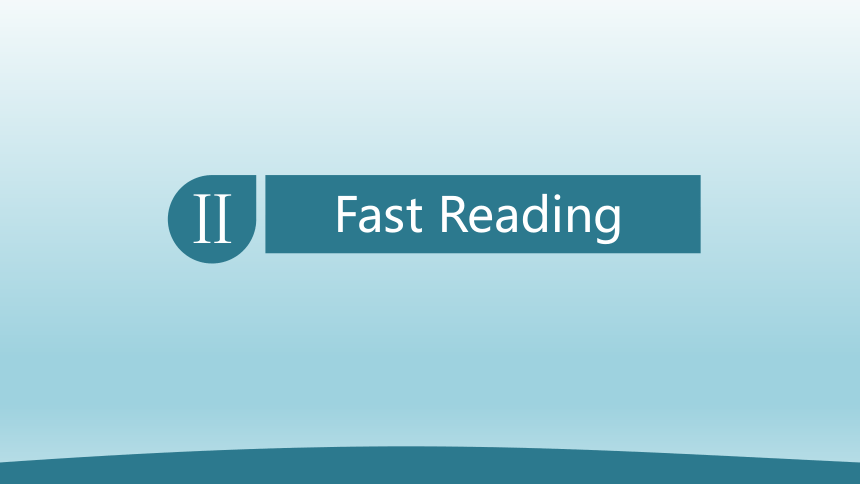
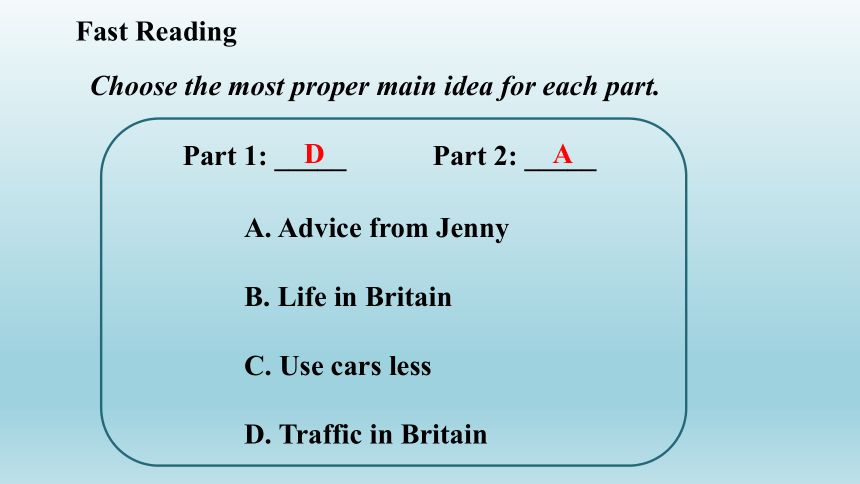
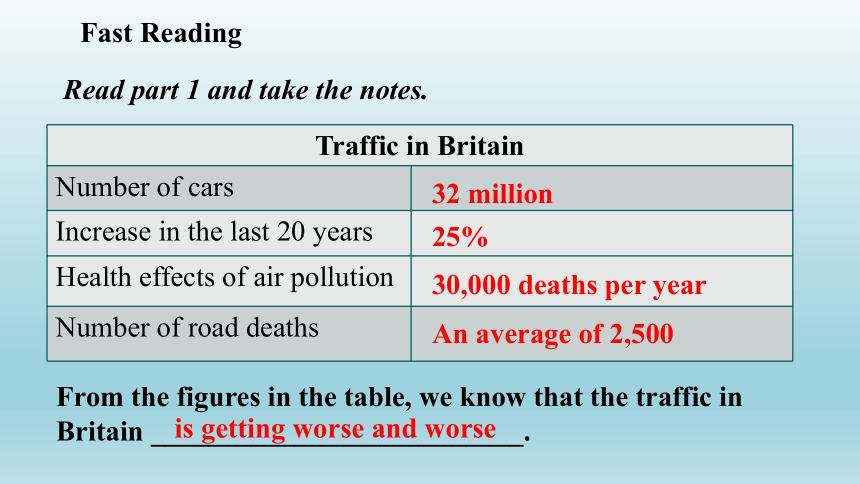
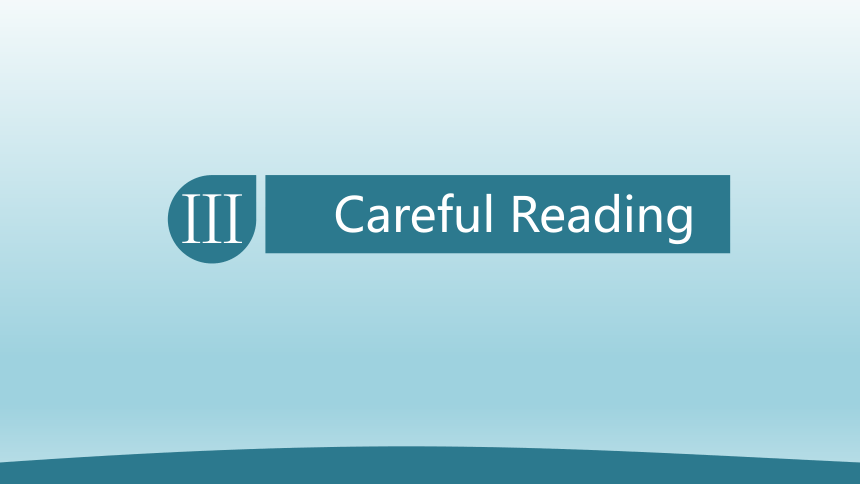
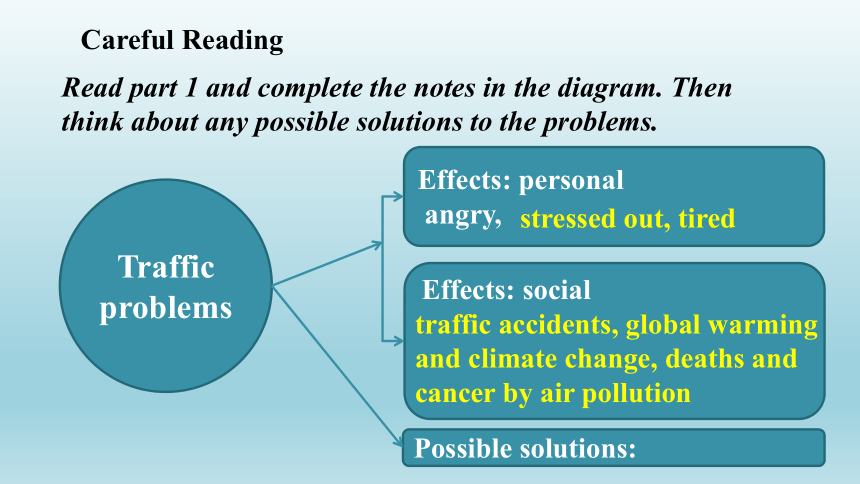
文档简介
(共24张PPT)
Unit 3 Conservation
Lesson 3 The Road to Destruction
目录页
contents
Pre-reading
I
Post-reading
IV
Fast Reading
II
Language Points
V
III
Careful Reading
Ⅵ
Homework
Ⅰ
Pre-reading
Pre-reading: Activate and share
How much time do you spend travelling to school every day How do you feel when you get stuck in traffic jams
to feel anxious to feel annoyed to feel stressed out
to feel tired to feel angry to feel helpless
Ⅱ
Fast Reading
Fast Reading
Choose the most proper main idea for each part.
Part 1: _____ Part 2: _____
A. Advice from Jenny
B. Life in Britain
C. Use cars less
D. Traffic in Britain
D
A
Fast Reading
Read part 1 and take the notes.
Traffic in Britain Number of cars
Increase in the last 20 years
Health effects of air pollution
Number of road deaths
32 million
25%
30,000 deaths per year
An average of 2,500
From the figures in the table, we know that the traffic in Britain __________________________.
is getting worse and worse
Ⅲ
Careful Reading
Effects: social
Read part 1 and complete the notes in the diagram. Then think about any possible solutions to the problems.
Traffic problems
Effects: personal
angry,
Possible solutions:
Careful Reading
stressed out, tired
traffic accidents, global warming and climate change, deaths and cancer by air pollution
Careful Reading
Read part 2 and complete the notes.
Advice from Jenny Advice Advantages / reasons
1. Use your legs
2. Relax on the bus or train
3. Needn’t make that journey
4. Share cars
5. Don’t just sit around and complain
Use public transport
Think before you go
Take action
Much cheaper and kinder to the environment
Save money, keep fit and help you live longer
How do you understand the title The Road to Destruction
Too many cars destroy roads.
We should build enough roads to reduce traffic jams.
C. Actually too many cars are destructive to our lives.
D. Using cars is destructive.
Reading Comprehension.
Careful Reading
2. The writer’s opinion is supported by____.
A. conversations
B. examples
C. figures
D. explanations
Careful Reading
Reading Comprehension.
3. What’s the writer’s attitude towards cars
A. He thinks they have more disadvantages than advantages.
B. He knows what he should do, but uses his car because it is convenient.
C. He thinks it would be easy for us all to use our cars less.
D. He thinks it not practical to use cars.
Careful Reading
Reading Comprehension.
Ⅳ
Post-reading
1. The boat ____________ the mud.
2. Workers who had lost their jobs _________________the way they had been treated.
3. Some types of cancer _____________ traffic pollution.
be addicted to be / get stuck in stress sb out
compare to be related to complain about
Complete the sentences with the words in the box.
was stuck in
complained about
are related to
Post-reading
5. I tried to give up smoking several times before I realized I __________________ it.
6. ____________ our small flat, Bill’s house seemed like a palace.
7. Studying for exams always ______________.
had been addicted to
Compared to
stresses me out
be addicted to be / get stuck in stress sb out
compare to be related to complain about
Complete the sentences with the words in the box.
Post-reading
Read and fill in the blanks.
1. How often do we _____________________ (陷入交通堵塞)
2. Some types of cancer _____________ (与……有关) traffic pollution.
3. So why do we ________ (继续) using our cars so much
4. ___________ (平均起来), about forty people travel in one bus, while the same number occupy thirty-three cars.
5. I have to ________ (搭载) my daughter at four o’clock.
get stuck in traffic jams
are related to
carry on
On average
pick up
Post-reading
Ⅴ
Language Points
admit v 承认,供认;许可进入,接纳;容许,容纳
① He admitted ____________________ the bicycle.
他承认偷了自行车。
② He ______________ Peking University after graduation.
他毕业后被北大录取。
③ The regulations ________ no exception.
规章不容破例。
admit of
stealing / having stolen
was admitted to
Focus on Language: Important word
考点聚焦:
① admit + n / doing sth 承认某事 / 做某事
② admit + that clause 承认……
③ admit + n + to be 承认……
④ admit of 容许有
⑤ admit sb / sth into / to 允许某人 / 某物进入
⑥ admission n 接纳,准入;入场费;承认
Focus on Language: Important word
How often do we arrive at work or school, stressed out, tired and angry
有多少次我们在极度焦虑,疲惫,恼怒的状态下到达办公室或学校?
解析:stressed out,tired,angry在此处是形容词作状语。 当形容词作状语时,表示伴随、结果、原因、时间、条件等。该句子中的形容词是作伴随状语。
1. He returned home, safe and sound.
他安然无恙地回家了。
2. The old lady lay in bed, awake.
那个老太太躺在床上,醒着。
Page
58
Focus on Language: Difficult sentence
单句改错
1. Too nervously to reply, he stared at the floor.
_____________________________________.
2. Much interestedly, he agreed to give it a try.
_____________________________________.
Too nervous to reply, he stared at the floor
Much interested, he agreed to give it a try
Focus on Language: Difficult sentence
VI
Homework
Make a poster based on what you have learnt to encourage people in your neighborhood to use their vehicles wisely. Search for facts and data to make your poster convincing. Then share your work in groups.
Homework
Unit 3 Conservation
Lesson 3 The Road to Destruction
目录页
contents
Pre-reading
I
Post-reading
IV
Fast Reading
II
Language Points
V
III
Careful Reading
Ⅵ
Homework
Ⅰ
Pre-reading
Pre-reading: Activate and share
How much time do you spend travelling to school every day How do you feel when you get stuck in traffic jams
to feel anxious to feel annoyed to feel stressed out
to feel tired to feel angry to feel helpless
Ⅱ
Fast Reading
Fast Reading
Choose the most proper main idea for each part.
Part 1: _____ Part 2: _____
A. Advice from Jenny
B. Life in Britain
C. Use cars less
D. Traffic in Britain
D
A
Fast Reading
Read part 1 and take the notes.
Traffic in Britain Number of cars
Increase in the last 20 years
Health effects of air pollution
Number of road deaths
32 million
25%
30,000 deaths per year
An average of 2,500
From the figures in the table, we know that the traffic in Britain __________________________.
is getting worse and worse
Ⅲ
Careful Reading
Effects: social
Read part 1 and complete the notes in the diagram. Then think about any possible solutions to the problems.
Traffic problems
Effects: personal
angry,
Possible solutions:
Careful Reading
stressed out, tired
traffic accidents, global warming and climate change, deaths and cancer by air pollution
Careful Reading
Read part 2 and complete the notes.
Advice from Jenny Advice Advantages / reasons
1. Use your legs
2. Relax on the bus or train
3. Needn’t make that journey
4. Share cars
5. Don’t just sit around and complain
Use public transport
Think before you go
Take action
Much cheaper and kinder to the environment
Save money, keep fit and help you live longer
How do you understand the title The Road to Destruction
Too many cars destroy roads.
We should build enough roads to reduce traffic jams.
C. Actually too many cars are destructive to our lives.
D. Using cars is destructive.
Reading Comprehension.
Careful Reading
2. The writer’s opinion is supported by____.
A. conversations
B. examples
C. figures
D. explanations
Careful Reading
Reading Comprehension.
3. What’s the writer’s attitude towards cars
A. He thinks they have more disadvantages than advantages.
B. He knows what he should do, but uses his car because it is convenient.
C. He thinks it would be easy for us all to use our cars less.
D. He thinks it not practical to use cars.
Careful Reading
Reading Comprehension.
Ⅳ
Post-reading
1. The boat ____________ the mud.
2. Workers who had lost their jobs _________________the way they had been treated.
3. Some types of cancer _____________ traffic pollution.
be addicted to be / get stuck in stress sb out
compare to be related to complain about
Complete the sentences with the words in the box.
was stuck in
complained about
are related to
Post-reading
5. I tried to give up smoking several times before I realized I __________________ it.
6. ____________ our small flat, Bill’s house seemed like a palace.
7. Studying for exams always ______________.
had been addicted to
Compared to
stresses me out
be addicted to be / get stuck in stress sb out
compare to be related to complain about
Complete the sentences with the words in the box.
Post-reading
Read and fill in the blanks.
1. How often do we _____________________ (陷入交通堵塞)
2. Some types of cancer _____________ (与……有关) traffic pollution.
3. So why do we ________ (继续) using our cars so much
4. ___________ (平均起来), about forty people travel in one bus, while the same number occupy thirty-three cars.
5. I have to ________ (搭载) my daughter at four o’clock.
get stuck in traffic jams
are related to
carry on
On average
pick up
Post-reading
Ⅴ
Language Points
admit v 承认,供认;许可进入,接纳;容许,容纳
① He admitted ____________________ the bicycle.
他承认偷了自行车。
② He ______________ Peking University after graduation.
他毕业后被北大录取。
③ The regulations ________ no exception.
规章不容破例。
admit of
stealing / having stolen
was admitted to
Focus on Language: Important word
考点聚焦:
① admit + n / doing sth 承认某事 / 做某事
② admit + that clause 承认……
③ admit + n + to be 承认……
④ admit of 容许有
⑤ admit sb / sth into / to 允许某人 / 某物进入
⑥ admission n 接纳,准入;入场费;承认
Focus on Language: Important word
How often do we arrive at work or school, stressed out, tired and angry
有多少次我们在极度焦虑,疲惫,恼怒的状态下到达办公室或学校?
解析:stressed out,tired,angry在此处是形容词作状语。 当形容词作状语时,表示伴随、结果、原因、时间、条件等。该句子中的形容词是作伴随状语。
1. He returned home, safe and sound.
他安然无恙地回家了。
2. The old lady lay in bed, awake.
那个老太太躺在床上,醒着。
Page
58
Focus on Language: Difficult sentence
单句改错
1. Too nervously to reply, he stared at the floor.
_____________________________________.
2. Much interestedly, he agreed to give it a try.
_____________________________________.
Too nervous to reply, he stared at the floor
Much interested, he agreed to give it a try
Focus on Language: Difficult sentence
VI
Homework
Make a poster based on what you have learnt to encourage people in your neighborhood to use their vehicles wisely. Search for facts and data to make your poster convincing. Then share your work in groups.
Homework
同课章节目录
- Unit 1 Relationshis
- Lesson 1 Teachers
- Lesson 2 How Do We Like Teachers’ Feedback?
- Lesson 3 So Close,Yet So Fa
- Unit 2 Success
- Lesson 1 Money vs Success
- Lesson 2 Top Five Secrets of Success
- Lesson 3 Getting to the Top
- Unit 3 Conservation
- Lesson 1 The Sixth Extinction
- Lesson 2 War on Plastic Packets
- Lesson 3 The Road to Destruction
